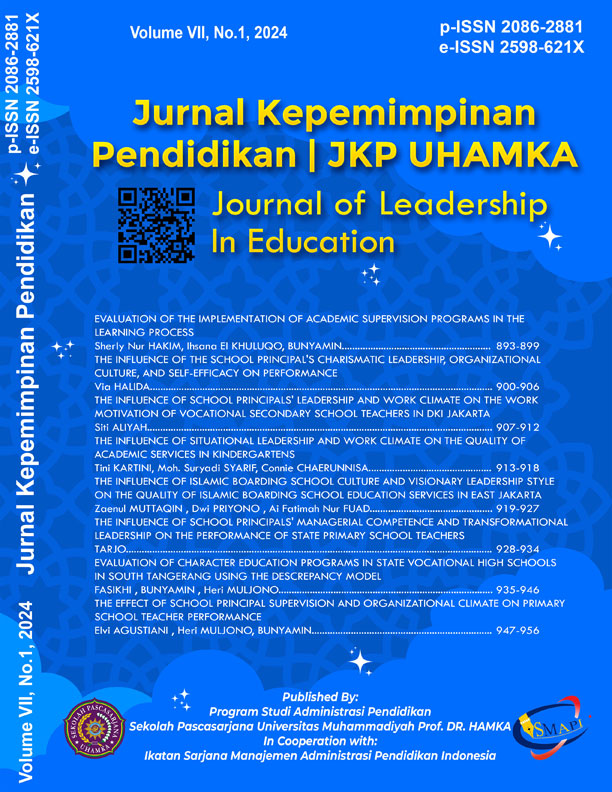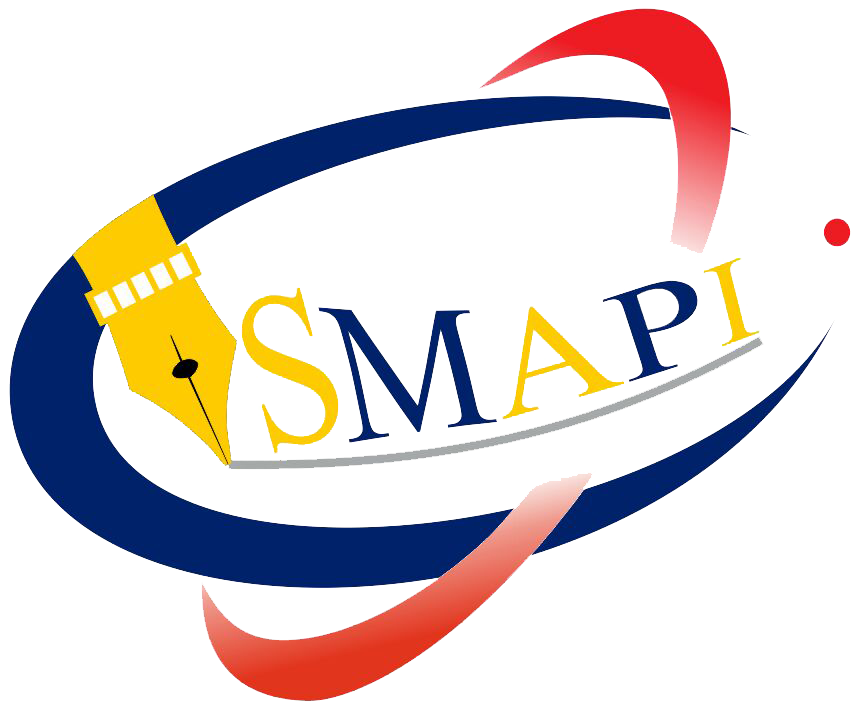THE INFLUENCE OF THE SCHOOL PRINCIPAL'S CHARISMATIC LEADERSHIP, ORGANIZATIONAL CULTURE, AND SELF-EFFICACY ON PERFORMANCE
Keywords:
Head Master’s Charismatic Leadership, Organizational Culture, self-efficacy, Teacher PerformanceAbstract
This research is aim to test empirically the influence of head master charismatic leadership organization culture and self efficacy against junior high school teacher performance in Sukmajaya District, Depok City. This research used quantitative approach with casual survey method and path analysis. The data analysis technique used descriptive statistic and inferential. The result of this research shows that: 1) There is positive effect and significant of head master’s charismatic leadership (X1) on teacher performance (X4) as big as ρ41 = 0,579 dan r14 = 0,920. 2) There is positive and significant effect of organization culture (X2) on teacher performance (X4) as big as ρ42 = 0,154 dan r24 = 0,457. 3) There is effect of head master’s charismatic leadership on self efficacy (X3) as bis as ρ31 = 0,742 dan r13 = 0,469. 4) There positive and significant effect of organization culture on self efficacy (X3) as big as ρ32 = 0,898 dan r23 = 0,920. 5) There’s positive and significant effect of head master’s charismatic leadership on (X1) on organization culture (X2) as big as ρ21 = 0,471 dan r12 = 0,471. 6) There’s positive and significant effect of self efficacy (X3) on teachers performance (X4) as big as ρ43 = 0,051 dan r34 = 0,472. Thus there is a positive and significant influence of the charismatic principal, organizational culture, self-efficacy on teacher performance.
Downloads
References
Angeles, M. P. H. (2012). Teaching efficacy, interpersonal, intrapersonal skills and teaching performance in the tertiary school. IAMURE International journal of social sciences, 2(1). https://doi.org/10.7718/ijss.v2i1.8
Ansar, S., Aziz, H., Majeed, A., & Rassol, U. (2016). Impact of charismatic leadership style on organizational effectiveness. International journal of scientific & engineering research, , 7(11).
Ashari, L. B. (2020). Pengaruh kompensasi dan budaya organisasi terhadap kinerja karyawan melalui motivasi sebagai variabel intervening pada pg. Kebon agung. Jurnal ilmu manajemen (JIMMU), 4(2), 194. https://doi.org/10.33474/manajemen.v4i2.3886
Bandura, A. (1977). Social learning theory. Englewood Cliffs, N.J.: Prentice-Hall, 1977. 247 pp., paperbound. Group & organization Studies, 2(3), 384–385. https://doi.org/10.1177/105960117700200317
Erni, M., Foeh, J. E., & Silalahi, E. E. (2022). Pengaruh motivasi, disiplin dan lingkungan kerja terhadap kinerja guru (deskripsi kajian studi literatur kinerja guru). 4(1). https://doi.org/10.31933/jemsi.v4i1
DeGroot, T., Kiker, D. S., & Cross, T. C. (2000). A meta‐analysis to review organizational outcomes related to charismatic leadership. Canadian journal of administrative sciences / revue canadienne des sciences de l’administration, 17(4), 356–372. https://doi.org/10.1111/j.1936-4490.2000.tb00234.x
Denison, D. R., & Mishra, A. K. (1995). Toward a theory of organizational culture and effectiveness. Organization Science, 6(2), 204–223. https://doi.org/10.1287/orsc.6.2.204
Faizal, F., Makhdalena, M., & Kartikowati, R. S. (2019). Pengaruh budaya organisasi dan kompensasi terhadap kinerja guru di SMK Negeri se- Kota Pekanbaru. Jurnal JUMPED (Jurnal Manajemen Pendidikan), 7(2), 162. https://doi.org/10.31258/jmp.7.2.p.162-177
Fullan, M. (2014). The principal: Three keys to maximizing impact. Jossey- Bass.
Gibson, J. L., Ivancevich, J. M., Donelly Jr, J. H., & Konopaske, R. (2012). Organizations: behavior, structure, processes (14th Edition). McGraw-Hill Companies, Inc.
Hanum, N. A., Fithriyah, A., & Sumarsono, R. B. (2019). Pandangan konsep kepemimpinan kharismatik.
Howell, J. M., & Frost, P. J. (1989). A laboratory study of charismatic leadership. in behavior and human decision processes (Vol. 43).
Indra Dermawan. (2021). The influence of charismatic leadership and training on the performance of the indonesian navy hydrographic and oceanographic center with self efficacy as an intervening variable. Jurnal dinamika manajemen dan bisnis, 3(2), 111– 136. https://doi.org/10.21009/JDMB.03.2.6
Magistra, S. N., Santosa, S., & Indriayu, M. (2021). Effect of self-efficacy and technostress on teacher performance through organizational commitments. Dinamika pendidikan, 16(1), 75–82. https://doi.org/10.15294/dp.v16i1.28993
Meslec, N., Curseu, P. L., Fodor, O. C., & Kenda, R. (2020). Effects of charismatic leadership and rewards on individual performance. The Leadership quarterly, 31(6), 101423. https://doi.org/10.1016/j.leaqua.2020.101423.
Mulyasa. (2013). Manajemen kepemimpinan kepala sekolah. Bumi Aksara
Nandal, V., & Krishnan, V. R. (2000). Charismatic leadership and self- efficacy: Importance of role clarity. Management and labour studies, 25(4), 231–243. https://doi.org/10.1177/0258042X0002500401
Rachmat, A., & Krisnadi, I. (2020). Analisis efektifitas pembelajaran daring (online) untuk siswa SMK Negeri 8 Kota Tangerang pada saat pandemi Covid 19. Jurnal Pendidikan, 1(1), 1–7.
Rahmah, A., Kristiawan, M., & Destiniar, D. (2021). The influence of principal leadership and organizational climate on teacher performance. JPGI (Jurnal Penelitian Guru Indonesia), 6(1), 229. https://doi.org/10.29210/021045jpgi0005
Salehudin, M. (2022). Guru menulis artikel ilmiah untuk meningkatkan karya dan kinerja guru sekolah dasar. Jurnal inovasi penelitian dan pengabdian masyarakat, 2(1), 57–68. https://doi.org/10.53621/jippmas.v2i1.80
Sari, N. P., & Makaria, E. C. (2022). Tantangan guru pada masa pandemi Covid-19. Jurnal basicedu, 6(2), 2962–2969. https://doi.org/10.31004/basicedu.v6i2.2561
Tannady, H., Ismuhadjar, & Zami, A. (2017). Factors affecting the performance of driver : The experience of transjakarta bus driver. International journal of research science & management, 4(11).
Shamir, B., House, R. J., & Arthur, M. B. (1993). The motivational effects of charismatic leadership: A self-concept based theory. Organization Science, 4(4), 577–594. https://doi.org/10.1287/orsc.4.4.577
Shea, C. M., & Howell, J. M. (1999). Charismatic leadership and task feedback: A laboratory study of their effects on self-efficacy and task performance.
Song, J. H., Chai, D. S., Kim, J., & Bae, S. H. (2018). Job performance in the learning organization: The mediating impacts of self-efficacy and work engagement. Performance improvement quarterly, 30(4), 249–271. https://doi.org/10.1002/piq.21251.
Taurisa, C., & Ratnawati, I. (2012). Analisis pengaruh budaya organisasi dan kepuasan kerja terhadap komitmen organisasional dalam meningkatkan kinerja karyawan (Studi pada PT. Sido Muncul Kaligawe Semarang). Jurnal Bisnis Dan Ekonomi (JBE), 19, 170– 187.
Yun, S., Gweon, H., & Sung, H. (2010). Pengaruh efikasi diri manajer relawan dan budaya organisasi terhadap kompetensi mereka. Institut Penelitian Korea Untuk Pendidikan & Pelatihan Kejuruan, 13(2), 185–204.
Zahrah, U., & Anitra, V. (2020). Pengaruh gaya kepemimpinan karismatik terhadap budaya organisasi pada Dinas Perpustakaan dan Kearsipan Daerah Provinsi Kalimantan Timur. Borneo Student Research, 1(2).
Downloads
Published
How to Cite
Issue
Section
License
Copyright (c) 2024 Via HALIDA

This work is licensed under a Creative Commons Attribution 4.0 International License.















